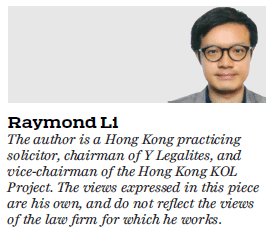Relaxing mortgage cap could lead to another housing bubble
Updated: 2019-11-04 08:43
(HK Edition)
|
|||||||||
The anti-government protests in Hong Kong are entering their 22nd week, marked by escalating violence and the use of gasoline bombs and tear gas, triggered by the now-shelved extradition bill. But Chief Executive Carrie Lam Cheng Yuet-ngor's benign intentions to address the housing conundrum in Hong Kong with homeownership measures in her third Policy Address to help the sandwich class should be closely scrutinized, particularly when we consider Hong Kong's property woes, a perennial housing shortage and skyrocketing property prices, preventing most of our millennials from obtaining a home. These have been widely seen as the major source of anger and frustration behind the current social unrest rocking Hong Kong.
Among the more than 220 new policy initiatives in the Policy Address, the land and housing policies unveiled at great length by our administration include providing 10,000 transitional homes in the coming three years; launching the second (Starter Homes) to provide 1,000 flats for sale at "below-market prices"; enabling the forceful resumption of private land for public purposes; and easing mortgage caps for first-time homebuyers. Against the backdrop of soaring property prices, Lam's unwavering commitment to ease the housing crisis by providing more affordable housing to the public deserves kudos. However, the proposed relaxation of the mortgage cap alone is not without controversy despite its benign intentions.

According to Lam, the government-backed Hong Kong Mortgage Corp will relax the ceiling of mortgage financing programs for first-time buyers. For those who are allowed to borrow up to 90 percent of the value of a flat, the lending cap is raised to HK$8 million ($1 million) from the existing HK$4 million. The cap is raised to HK$10 million from HK$6 million for potential homeowners able to take mortgages worth up to 80 percent of the value. For example, for a buyer taking on an HK$8 million home with a 90 percent mortgage, the initial down payment will fall to HK$800,000, compared with HK$2.4 million previously. But the monthly repayments will rise from HK$19,279 to more than HK$28,900, based on an effective mortgage rate of 2.625 percent on a 30-year loan.
While it is appreciated that, being excluded from the stress test, first-time homebuyers will find it easier to afford the down payment and own their homes as they no longer need to put in 40 to 50 percent of total property prices as their initial deposit, it is, however, illusory that their financial burdens in paying for their homes will be relieved. As Hong Kong's economy is clouded by a technical recession, this may be followed by shop closures and layoffs, so the monthly mortgage payment of nearly HK$30,000 for an HK$8 million home speak volumes of how grave a financial burden an average homebuyer may meet with to pay the monthly mortgage of a flat in the coming 30 years, providing mortgage rates will not rise thereafter.
With the lesser down payments, it is inevitable that people with less ability to repay the monthly mortgage would be enticed into the private property market. In the event of a drastic economic downturn with a surge in mortgage rates and free-fall of property prices, these vulnerable homeowners could be stuck with negative equity. A failure to repay the mortgage will result in their homes repossessed by financiers. This is reminiscent of the housing crash of 1997 in Hong Kong when, with local prime lending rates at 10 percent, mortgage service costs consumed two-thirds of income for moderately leveraged homeowners, and more than 100 percent for many households.
Another effect of relaxing the mortgage ceiling will be driving up already runaway property prices, fomenting the housing bubble that is now prevailing in Hong Kong. Taking advantage of the relaxed mortgage ceiling, many residential properties were seen with a 10 to 15 percent increase in their market prices in the secondary property market. It is rather ironic in the sense that such a proposed measure that originally aims to enable more homeowners with more-affordable down payments has ended up pushing up the already eye-popping property prices, with more unaffordable monthly mortgage payments to the detriment of many prospective first-time homebuyers.
According to Stein's Law, named after Herbert Stein, the late US economist, "If something cannot go on forever, it will stop." The same goes for our spiraling property prices. One must also guard against the simmering mortgage default risks borne by those first-time homebuyers and our society as a whole in the event of a housing bubble bursting. Every first-time homebuyer should be subject to a uniform stress test indiscriminately when evaluating their affordability of the monthly mortgage payment under the relaxed mortgage cap by considering their monthly income and the financial assets they own. Those who fail to meet the test should not be further considered for mortgage arrangements.
Like any responsible administration, our government's main obligation is to address the housing needs of the underprivileged who cannot even afford a roof over their heads, but not to facilitate homeownership in our city that's funded by taxpayers' money. The proposed government initiatives to provide transitional homes for people lining up for public housing and to launch Starter Homes pilot projects to cater to the middle-class housing need to be pointed in the right direction and warrant our unremitting support. Nevertheless, the proposed easing of the mortgage ceiling for the sake of enabling homeownership without any sound economic reasons will backfire and create a housing bubble that will likely burst - as has happened in Hong Kong before. One must remember that the road to hell is always paved with good intentions.
(HK Edition 11/04/2019 page5)